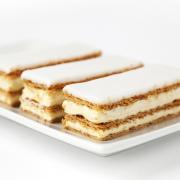When recently retired magazine editorRoger Borrell started baking his own bread, he not only discovered a new passion, but also, via the aisles of Booths, an iconic Stockport mill producing award-winning flour

When I decided to swap my career as a hyper-ventilating wage slave for life as a semi-professional layabout I made myself a bucket list. One with a difference.
This wasn't a 'must-do-before-I-die' litany of stuff like swimming with dolphins or learning ballroom dancing. For a start, I don't have the legs for the tango and where do you find a dolphin in Cheshire (apart from The Dolphin pub in Macclesfield)?
No, this was a list of things I aimed NEVER to do during my so-called golden years. It included never watching daytime TV (especially Flog It!), never getting angry about millennials accusing us baby boomers of being a drain on society even though I've paid income tax and national insurance for 40-plus years and, most importantly, I would never make those strange groaning noises old people emit whenever they sit down or stand up. Or, hopefully, any other noises.
Fourth on the list was a promise that I would never again eat rubbish bread. For decades, ridiculous deadlines forced me to inhale whatever piece of indigestible stodge happened to be adjacent to the mayo-flecked keyboard I was bashing. No more. In future, I would eat healthy and largely wholemeal and, what's more, I would make it myself.

This required some smelling salts in the Borrell household where, as the scullery boy, I rarely did anything more adventurous than the odd heart attack breakfast for weekend guests.
I almost fell at the first hurdle when an acquaintance who ran bread-making classes suddenly emigrated to the South Pacific. Not sure if there was a connection. That left me with YouTube videos, a very good book on bread-making from the Women's Institute and a rather fetching black pinny. My baking might be awful, but I'd do it with considerable dash.
I was never much of a Bake Off fan, but I had watched my mother make bread - she always said she liked to do it after gardening because kneading the dough got the dirt from under her nails. I think she was joking.
So, with clean fingernails, I set about my first loaf - a wholemeal creation made with flour that for some reason I'd bought on holiday. I mixed it with salt, sugar, dried yeast and 'hand hot' water (whatever that is) and kneaded it like my life depended on it. Gradually, this gobbet of goo turned into something like glazier's putty and it was safely deposited in a loaf tin, draped in a clean, disposable shower cap (don't ask - it was the wife's idea) and left somewhere warm.

For the next hour, I paced the kitchen like an expectant father. If there had been 20 Benson & Hedges nearby, I would have been tempted. Then, like the monster from the black lagoon, it started to rise. I was witnessing the miracle of yeast, something that still mystifies and thrills in equal measures (yes, I know, I should get out more).
After another bashing, I slashed at the dough like Jack the Ripper, dusted it with flour and put it in a hot oven where, modesty aside, it was transformed into a thing of beauty. With a thick, salty butter accompaniment it seemed like food of the gods.
Surveying the wrecked kitchen, I suspect it needed a firm of industrial cleaners - maybe the sort who tackle crime scenes - to remove the sticky directional spatter spread across the worktops. And I can't deny I spent several days picking bits of dried dough from my hair.
But, boy was it worth it. And now I've introduced my son and grandson to the dark arts and they're at it too. My lad even phoned for advice ("Put a metal dish in the bottom of the oven filled with water to create steam, son. Your crusts will be crustier than ever").

I'm proud to say no bought bread ever comes into the Borrell household. OK, I do occasionally crave a bacon sarnie in a couple of Warbie's finest white slices but now, when people ask me what I do all day as a retired old gimmer, I no longer have to mumble about reading or walking or pottering about in the garden.
I proudly announce that I'm aiming to become a master baker. That certainly breaks the ice at parties.
CHESHIRE'S FLOUR POWER
One of the joys of baking your own bread is experimenting with the almost infinite variety of flours available at the more upmarket food shops. It can be almost as much fun as the wine department, but without the hangovers.
I was particularly pleased to discover that my favourite bread flour was created by a Cheshire company - Nelstrop, of Stockport. This firm is anything but run of the mill (sorry about that).
It has operated from the same site - the Albion Mills in Manchester Road - for 200 years and it is run by the sixth generation of the same family with 80-year-old Conrad Nelstrop at its head.
Conrad's ancestor, 19-year-old William Nelstrop, came over the Pennines from Yorkshire, where the family had farmed. In 1820 he set up as a corn merchant on the Lancashire Hill and they are still there today. From that small beginning the firm has become one of the big players in the industry, using wheat from around the world, but also taking quality grain from the UK and, in particular, from Cheshire farms.
Along the way, they bounced back from a devastating fire at the mill in the 1890s and managed to keep producing flour to help feed the nation during the Manchester Blitz in the Second World War. The fact that the Luftwaffe's bombers always banked and changed direction as they approached Nelstrop's base prompted military top brass to strip the company's pre-war German-made milling machine to see if it contained a beacon to guide the enemy planes. It didn't.
From the days of deliveries via the Stockport Canal, it grew into one of the premier suppliers to big players like Warburtons and Northwich-based Roberts Bakery as well as a host of artisan and specialist bakers. A recent development has been a move into retail and the company's distinctive stitched brown paper bags of flour can now be found in Booths.
Nelstrop has a wide range of brands for home bakers - the 'Tasty Seeded' flour is the favourite in our house - and they've secured a remarkable number of golds from the Good Taste awards. Alexander, one of three Nelstrops from the sixth generation in the business, said: 'We've always worked very closely with bakeries but we have not been known to the wider public.
'We thought that with people's habits changing and the growing interest in home baking the time was right to move into retail and it has been very successful.'
The mill, employing 50 staff, has its own bakery where three members of the team test new flour blends by baking them into bread. They also provide an advice service to commercial bakers.
The mill works with up to 40 different types of flour, each with different characteristics. 'We bring in Canadian wheat from the Prairies and French wheat for baguettes, but we are particularly proud to produce traditional strong flour from Cheshire farms,' added Alexander.
This year's 200th anniversary will be marked by several events, including a new history of the Nelstrop business, fundraising activities for charity and the launch of new flours including one that will probably go under the name For Goodness Bakes. This is white flour that will be milled to retain many of the nutrients normally associated with wholemeal - a godsend for health conscious parents with picky kids!



























